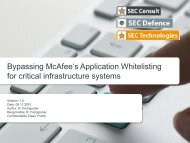1401-Baywatch
1401-Baywatch
1401-Baywatch
You also want an ePaper? Increase the reach of your titles
YUMPU automatically turns print PDFs into web optimized ePapers that Google loves.
J. Poort et al. / Telecommunications Policy ] (]]]]) ]]]–]]] 3<br />
Legal interventions<br />
Ruling 1<br />
(11/1/12)<br />
Ziggo & XS4ALL<br />
block access to TPB<br />
as of 1/2/12<br />
Ruling 2<br />
(10/5/12):<br />
KPN, UPC, T-Mobile<br />
& Tele2 block access<br />
to TPB<br />
as of 24/5/12<br />
2012 2013<br />
Measurements:<br />
Surveys<br />
Survey 1<br />
May 2012<br />
Survey 2<br />
Nov/Dec 2012<br />
BitTorrent<br />
Monitoring<br />
Monitor 1<br />
April 2012<br />
Monitor 2<br />
May 2012<br />
Monitor 3<br />
February 2013<br />
Fig. 1. Timeline of legal interventions and measurements.<br />
use of DRM is still common. Another strategy is to offer legal digital alternatives. Danaher, Dhanasobhon, Smith, and Telang<br />
(2010) study the effect of the removal of NBC content from the iTunes store in December 2007 and its restoration in<br />
September 2008, on BitTorrent piracy and DVD sales on Amazon. They associate the removal with an 11.4% increase in piracy<br />
of this content, twice the legal digital sales prior to removal. After the content was restored, no significant effects on DVD<br />
sales were found, nor on piracy levels. A more controversial strategy involves the pollution or poisoning of illegal file sharing<br />
networks with useless decoys (Christin, Weigend, & Chuang, 2005).<br />
Blocking access to TPB, the object of this study, stands in a tradition of legal actions against file sharing. These can be<br />
distinguished in action against individual file sharers, the demand-side of the illegal market, and actions against the supplyside,<br />
platforms that accommodate unauthorised file sharing.<br />
2.2.1. Legal action against individual file sharers<br />
In June 2003, the Recording Industry Association of America (RIAA) initiated a series of lawsuits against individual file<br />
sharers. Bhattacharjee, Gopal, Lertwachara, and Marsden (2006) tracked the online file sharing behaviour of over 2000<br />
individuals. They found that in reaction to these lawsuits, the majority of substantial file sharers decreased the number of<br />
files shared typically by 90% and small time file sharers typically to a third. However, the individuals who continued<br />
unauthorised file sharing increased their activity again after a court ruling that made it harder for the RIAA to request the<br />
names of file sharers from ISPs. Furthermore, the authors note that individuals may have gone off the radar, using more<br />
covert file sharing technologies.<br />
Adermon and Liang (2011) study the effects of the implementation of the Intellectual Property Rights Enforcement<br />
Directive (IPRED) in Sweden on music and movie sales. This European directive, implemented on 1 April 2009, substantially<br />
increased the risk of being caught and prosecuted for online file sharing. The authors have found an 18% drop in Internet<br />
traffic during the six months following the implementation. Using difference-in-difference analysis with Finland and<br />
Norway as controls, they conclude that the implementation led to an increase in the sale of physical music by 27% and digital<br />
music by 48%. No significant effects were found on cinema visits or DVD sales. On the other hand, it was also shown in the<br />
study that “the reform effects more or less disappeared after six months except for digital music sales”–the aforementioned<br />
relapse effect. They also report the outcome of two consumer surveys on file sharing. In 2009, 23% of the respondents stated<br />
they had stopped using file sharing sites as a result of the new legislation, 37% used file sharing sites less (N¼429). In 2010,<br />
52% stated they used file sharing sites less for downloading music than the year before (N¼1060). From this group who<br />
reported to download less than the year before, 56% mentioned Spotify as the reason for this, while 34% mentioned the<br />
IPRED, and 25% “better legal services”.<br />
Danaher, Smith, Telang, and Chen (in press) study the effect of the French HADOPI legislation on digital sales in the<br />
iTunes store. Under this “three strikes” legislation, implemented in October 2009, infringers caught first receive a warning.<br />
When caught again, they get a second warning, and after this, suspension of their Internet connection may be ordered.<br />
Using a difference-in-difference approach comparing French data with other countries, the authors have found a positive<br />
effect on song and album sales at iTunes of 22.5% and 25% respectively (conversion effect). However, it is impossible to<br />
disentangle the effects of the actual legislation and the education campaigns accompanying the introduction of HADOPI<br />
(awareness effect). Most of the effect seems to have arisen before the (amended) legislation was finally accepted by the<br />
Constitutional Council and diminished since then.<br />
2.2.2. Legal action against platforms that accommodate file sharing<br />
A different strategy is directed towards platforms that accommodate file sharing, the supply side of the illegal market.<br />
Blocking access to TPB stands in this tradition. An early victory of right holders against this supply side was the shutdown of<br />
Napster in July 2001. However, Napster was soon succeeded by alternative platforms such as KaZaA and BitTorrent clients<br />
that decentralise the file sharing process. The bootstrapping of the process occurs at sites such as TPB. An alternative<br />
Please cite this article as: Poort, J., et al. <strong>Baywatch</strong>: Two approaches to measure the effects of blocking access to The<br />
Pirate Bay. Telecommunications Policy (2014), http://dx.doi.org/10.1016/j.telpol.2013.12.008i






